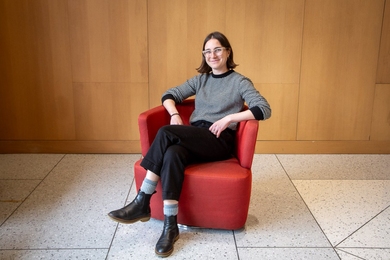A successful rush at fraternities, sororities and independent living groups has only partly helped students and administrators cope with a need to house unexpectedly high numbers of freshmen, returning upperclassmen and students from Britain participating in the Cambridge-MIT Institute exchange program.
In admissions parlance, the summer "melt" didn't melt: an unusually high percentage of freshmen accepted last spring chose to come to MIT this fall. Instead of the expected 1,000 freshmen, there are 1,030 here.
Administrative initiatives designed to improve the quality of residential life at MIT have had challenging short-term impact, too.
More than 100 students took advantage of a new policy allowing entering freshmen to select nonresidential fraternity, sorority or independent living group (FSILG) membership. A total of 481 students joined FSILGs, according to Joanne Chang, InterFraternity Council rush chair and a junior in electrical engineering and computer science.
Also, 37 resident advisors, one in each FSILG, and 70 graduate resident tutors in residence halls are occupying undergraduate rooms in McCormick, Burton-Conner and Next House.
As a result of all these changs, Baker House now has five students in eight of its rooms that normally hold four, and some rooms in MacGregor and New House have one more occupant than expected.
Housemasters in the affected dormitories are remaining positive as the situation is being resolved.
Professor Munther Dahleh and Jinane Abounadi, MacGregor housemasters, praised MacGregor's house government for doing a "great job coordinating and, more importantly, informing our incoming students of the implications of crowding. Overall, the students are doing well. They were surprised at the idea of having a roommate, given that MacGregor is known as the 'singles' dorm," they said.
"All the student leaders, the housemasters, and the [graduate resident tutors] at MacGregor are hoping to be able to free up as many lounges as possible in the early part of the term. We are doing our best to support the freshmen who are affected by both the crowding and de-crowding of the lounges," they said.
"Senior House was overcrowded by about five students at the start of the term. It is the first time Senior House has been crowded in the seven years I have been housemaster," said Professor Henry Jenkins, director of the Comparative Media Studies Program and housemaster at Senior House. "But the crowding is already subsiding. Students have transferred out of the dorm and we now are shifting students into less crowded rooms. Crowding was pretty much a nonevent for us."
A version of this article appeared in MIT Tech Talk on September 12, 2001.





